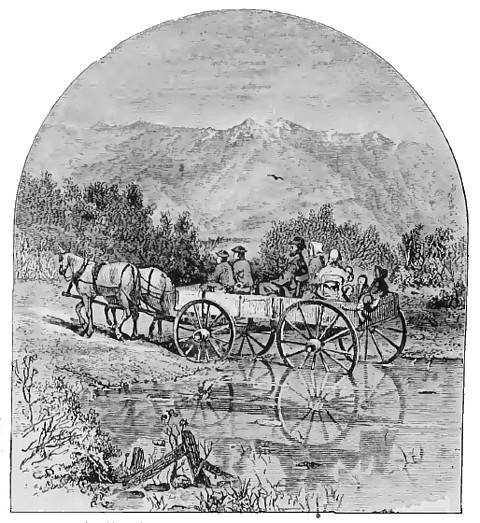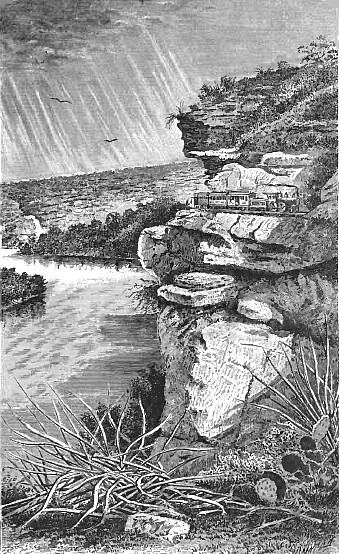WALKER, YAVAPAI COUNTY
This district lies about 14 miles south of Prescott. It is five miles
long and two wide, and contains over 200 promising locations. The great want
of this district heretofore has been reduction works, which are now being
supplied by the Lynx Creek Smelting Co., who are putting up a first-class 15
-ton smelter, with all the necessary appliances. Wood and water, two great
essentials for successful mining, are abundant. The Accidental, one of the
oldest locations in the district, of which C. P. Dake is Superintendent, is
developed by a shaft 300 feet deep. The ore is worked in
arastras, and yields from $30 to $130 per ton in gold and silver. C.
Y. Shelton owns a group of mines which are highly spoken of, among which are
the American Flag, Grey Eagle, Capital, and Eureka. Considerable work has
been done on the Fortune and Champion, from both of which good ore has been
extracted. The Hidden Treasure, owned by the Yavapai Mill and Mining Co.,
and the Pine Mountain, are also considered promising mines.
WALNUT GROVE, YAVAPAI
COUNTY
This district is situated south of Prescott, and is bounded on the north
by the Hassayampa and on the south by the Tiger districts. It contains gold,
silver, and copper ledges, some of which give high assays, but have not as
yet been developed to any great extent. Wood and water are sufficiently
abundant to afford good facilities for the reduction of ores. The Antelope
Copper M. Co., incorporated under the laws of the State of New York,
Townsend Cox, President, have recently erected a smelter for the purpose of
working some promising properties belonging to them. The company is
represented by Mr. C. C. Bean, of Prescott.
WARREN DISTRICT,
COCHISE COUNTY
This district is situated in the southern portion of the county, about 35
miles south of Tombstone, embracing within its limits what is known as the
Mule Pass Mountains. This section of the country was one of the strongholds
of the Apaches, who for a long time stubbornly resisted all attempts to
drive them from it. Here, locked in by rugged mountains, broken up by
narrow and steep canons, these relentless savages found a natural fastness,
from which they sallied forth in forays on the settlements of Sonora,
stealing cattle and mules, and driving them in such numbers through the
principal pass in the mountains as to give it the name of Puerta de las
Mulas. The Mexicans often pursued the savages up to the mouth of this pass,
but owing to the desperate resistance made, were never able to pierce it.
When the Americans obtained possession of the Territory a determined effort
was made to dislodge them and where the Rucker mine is now located, occurred
one of the last actions between the Apaches and our troops.
Some ten years since, Major Brayton, while in pursuit of Cochise, the famous chief, encamped in these mountains a day or two, to rest his command; and at this time George Warren, his guide, who had been an old miner, observed mineral float, and following it discovered the croppings of the now celebrated Copper Queen mine. He subsequently made an attempt to more thoroughly examine the mines, but was prevented by the hostility of the Indians. In September, 1877, Warren, accompanied by D. B. Rea, and guarded by an escort of United States troops, again visited this section, and made a number of locations. During the same year Captain Jack Dunn, another pioneer scout and guide who entered the pass in pursuit of Indians, discovered and located the Rucker mine, which promises to be another copper ore bonanza. The Copper Queen was located in 1878 by J. Jones and J. S. Halcro, who did no work on it; and it was jumped by other parties, who finally sold it, together with the Copper King, to W. H. Martin & Co., of San Francisco, for the sum of $18,000. This firm commenced the erection of a furnace in July, 1880, and on the 15th of September the first bullion was shipped. The Hon. P. Hamilton, who has recently visited the mine, says: "The Copper Queen, as far as opened, is an immense mountain of ore, averaging over 20 per cent, pure copper. The claim is opened by over 600 feet of tunnels, cross-cuts, and winzes, exposing an ore body 160 feet in length, 120 feet in width, and over 150 feet in thickness. From careful calculations it is estimated that over $2,000,000 worth of ore is already in sight. A large excavation has been made in the side of the mountain, and the ore is quarried out and wheeled to a chute which delivers it at the smelter, a few feet below. It will thus be seen that the cost of extraction is merely nominal, and Superintendent Williams assured your correspondent that, with his present facilities, he could work ore carrying six per cent, copper.
The mine has recently been sold to a New York company for the sum of $1,250,000. An additional furnace with a capacity of 30 tons is being erected. The Copper King adjoins the Copper Queen on the west, and will no doubt when developed yield a large amount of copper. The Neptune Mining Co. own nine or ten locations, and have expended considerable money in opening up some of their properties, which have been developed sufficiently to prove that they are very valuable. This company has recently surveyed a line for a railroad to Hereford, on the San Pedro River, where they are erecting extensive smelting works. The Atlanta and Belle Isle claims lie near the Copper Queen, and have found, in addition to their copper ledge, a large vein of carbonate of lead dipping in the opposite direction. Besides those mentioned above are the Twilight, New York, New Year, Galena, Richmond, Watson, Campbell group, Corbin group, and other mines which no doubt contain rich ore. The mineral belt in this district is about eight miles long and three wide. The ores, which are principally malachite and azurite carbonates, are found in large masses or chambers in a limestone formation. Wood for mining and other purposes is abundant, and there is a fair supply of water. There are many persons engaged in prospecting in this vicinity, which, together with the extensive operations at the Copper Queen, makes Bisbee, the central point, thriving town.
WASHINGTON CAMP, PIMA
COUNTY
See Patagonia District.
WEAVER, YAVAPAI COUNTY
This district is situated in the southwestern portion of the county, and
is bounded on the east by the Tiger and Humbug districts. It is sometimes
called Weaver No. 2, to distinguish it from another district of the same
name in Yuma County. Both were named after one of the pioneer prospectors of
the Territory. The Hassayampa Creek and other streams afford a good supply
of water for milling purposes, and the mountain ridges afford a fair supply
of timber. The mines in this section are worked almost exclusively
gold ores, there being many quartz ledges which prospect
well, and also placer diggings which are being worked to a considerable
extent, yielding from $1.50 to $3.00 per day. In Peeples Valley the Model
Co. and the Bed Rock Co. have erected mills, both of which are steadily at
work crushing good ore. The Emma mine has been developed by a tunnel 100
feet in length, and an incline 108 feet. The vein is argentiferous galena,
carrying some copper, and is from three to four feet in width. It is said to
assay from $20 to $500 per ton. The Lewis and other companies are also
taking out good ore.
WEAVER, YUMA COUNTY
This district is bounded on the west by the Colorado River, and on the
south by Eureka district. It contains gold, silver, and copper mines, some
of which were discovered more than twenty years ago, and have been worked at
intervals ever since. Gold placers were discovered in this section by Capt.
Pauline Weaver, which created a considerable
gold rush excitement, and it is said yielded a large amount of gold.
The Colorado mine in this district has been extensively prospected, and ore
of a high grade extracted. At present
mining
operations are almost suspended.
Return
to The Arizona Page:
Arizona Gold Rush Mining History



